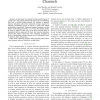Free Online Productivity Tools
i2Speak
i2Symbol
i2OCR
iTex2Img
iWeb2Print
iWeb2Shot
i2Type
iPdf2Split
iPdf2Merge
i2Bopomofo
i2Arabic
i2Style
i2Image
i2PDF
iLatex2Rtf
Sci2ools
97
Voted
GLOBECOM
2008
IEEE
2008
IEEE
Delay Analysis of Wireless Nakagami Fading Channels
—In this paper we analyze the delay performance of a single user with perfect channel state information transmitting data over a wireless fading channel. We consider a dynamic resource allocation policy that maximizes average capacity by adapting transmission power, as well as a policy that adapts instantaneous bandwidth. Nakagami fading is assumed, and the impact of the fading parameter, m, as well as the channel quality in terms of signal-to-noise ratio on the mean queuing delay of transmitted data is analyzed. We show that resource allocation policies that achieve superiority over competing strategies in terms of maximizing average capacity do not necessarily result in superior delay performance.
Average Capacity | Delay Performance | GLOBECOM 2008 | Telecommunications | Wireless Fading Channel |
Related Content
| Added | 29 May 2010 |
| Updated | 29 May 2010 |
| Type | Conference |
| Year | 2008 |
| Where | GLOBECOM |
| Authors | Jared Burdin, Randall Landry |
Comments (0)

